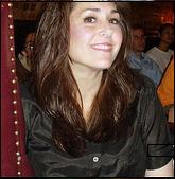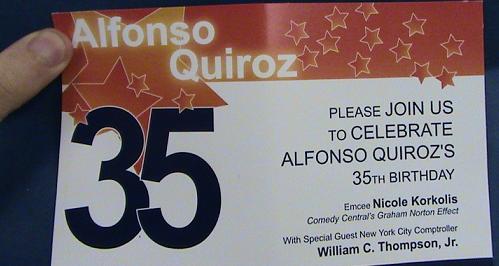= |
|||||||||||||||||||||||||||||||||||||||||||||||||||||||||||||||||||||||||||||||||||||||||||||||||||||||||||||||||||||||||||||||||||||
|
|||||||||||||||||||||||||||||||||||||||||||||||||||||||||||||||||||||||||||||||||||||||||||||||||||||||||||||||||||||||||||||||||||||
|
Articles and Reviews from the Fri 24 Aug 2007
I'll show you mine
I'LL SHOW YOU MINELAUGHING HORSE @ BERLIN (VENUE 158) TURN right at the vast billboard that says "Ricky Gervais at The Castle is Sold Out" and go to Berlin. The venue is slightly smaller than the billboard but well worth finding. As is Nicole Korkolis. She had the gig from hell when I went - a dozen or so of us hugging the walls of a nightclub, a broken mike stand and all the comedy atmosphere of an anger-management counselling session, but she turned it around. She doesn't have the best start but once she gets going, she is great. Hard-hitting, fun, well-observed, edgy, clever material from a smart, sassy, memorable comic. She has some outstanding lines and she delivers like the Pony Express. The section about the incidence of rape in New York is brilliant. And her advice to the victims is possibly the cleverest, funniest thing I have heard all month. I hope she comes back next year. Until tomorrow. Today 5.40pm
Jo Caulfield and Nicole Korkolis
Good thing festival performers are so entertaining. Today,
two funny women with one man in common... Jo Caulfield has
worked as a scriptwriter on Graham Norton's British TV show.
Her latest Fringe show, Jo Caulfield Goes to Hell, is at
Assembly @ George Street until 27 August. Nicole Korkolis has
worked as a scriptwriter on Graham Norton's US TV show. Her
debut Fringe show, I'll Show You Mine, is at Laughing Horse @
Berlin until 25 August.
JO CAULFIELD: I got the job because I gave Graham a lift. I knew him before he was famous and I do remember that we bonded while driving from Chester to London, very very slowly. We got to London about 4am and I thought, "I can't throw a poof out of a car at 4am. That's mean." So I drove him all the way to Hackney. An extra two hours for me. NICOLE KORKOLIS: I've never met a comedian who would do that. JC: I was actually the warm-up at first. He wanted his friend, who's a very extrovert lesbian who plays the organ, to give out snacks, and the producers said, "You can't do that, you have to have a warm-up." Then the second series, they had trouble getting people to write, because they'd write very gay - but a 1970s John Inman gay ... NK: Wait. John Inman? JC: He was in Are You Being Served. Gay but doesn't have sex. That kind of gay. NK: Right. You weren't supposed to think he was gay. JC: I don't know what you were meant to think. So anyway, they said "try Jo out" and I ended up working him for ever. NK: With me it was a Tuesday night. I didn't want to go, but I went and there were six people in the audience, and two of them were Graham and one of his people. And apparently he thought I was funny. The next morning I got a call to come in. I wrote 25 jokes, sent them to him and the next Monday I was working. I know you were his person. He talked about you - very "ahhh Jo". But he wanted American writers because... he wanted the difference. The big example was always Catherine Zeta-Jones. Apparently they love to make fun of her here [in the UK] and in America nobody gives a shit. Some people think she's cheap here, apparently. In America we're like, [indifferently]. 'oh, she's pretty'." (The pair then discuss Liz Hurley, Lindsay Lohan and Paris Hilton at some length, in a manner that couldn't possibly be printed in this newspaper. And don't look for the audio file on the Scotsman website either because it ain't there). JC: So it is always celebrity, isn't it? And also quite snobby. I think that's why [Graham] needed American writers. It's that weird thing where you look at an audience and you can judge things about them based on the way they look, then when you go to America you think, I can't quite work out what what you're wearing means about you. So you need someone to go, oh that means new money, or... NK: British people can't tell by looking at Americans what...? JC: Not so easily, no. You can't tell what's cheap. That's what you need to know, because I do think Graham's very snobby. Which is a very Irish thing, I think. NK: I think he said one time he spent £800 on a pair of jeans. It's clothes that can tell you if someone's cheap, I guess, but it's also hair in America. Or too much nail polish. JC: I remember during the first series people were writing very studenty male jokes about smoking dope. So you'd know the jokes you'd never do. You'd also know that he'd do a joke about Darfur, but in his way. He is very interested in politics. NK: That was one of the things they said to us later that they really liked, when we went into sort of literary jokes, to show how smart he was. JC: Sometimes on the chat show he'd make some quite good points. And Graham would be like, ooh, look at me with my points! The monologue was quite clever with interesting references, and then there'd be, you know, a joke about Jordan having a big fanny. He really prided himself on the fact that you could try to connect with all different kinds of people but also throw in a little intellectual reference and have some sort of point. NK: That's what's so great about him, I think, that he is so smart. He makes it seem so accessible and sweet and funny. JC: We never really had a discussion about what we could or couldn't say. But I remember there was one thing where we did completely misread the public. It was the British soldiers' version of Abu Ghraib prison [in Iraq]. We had the American pictures, which were terrible. And then there were the British soldiers who had done some things and it seemed really tame compared to what the Americans had done. We thought it was all a bit of a laugh and we were completely wrong. Graham's attitude was that the British soldiers weren't very good as torturers. The audience sort of stared at us in horror that we thought it was funny. The BBC practically vomited. NK: We were pretty tame because American audiences won't put up with as much as British audiences. JC: When you're doing five nights a week you can get a bit carried away and lose track of reality. NK: What was that like? We were once a week. JC: It was a nightmare, exhausting for Graham. NK: Is it not freeing in a way, that you do the show and then it's gone and not a big thing? JC: Actually it meant that each show was a big thing. Every day it had to be good. And every day there isn't enough news. People would say all the time, 'I really liked the show when it was once a week but five days a week, I don't see the point.' Maybe our attention span is shorter. NK: Or maybe you're smarter? JC: I think so. We need challenging TV, every night. NK: I think that's what it is... Thank God Americans aren't going to read this. • To listen to other Brief Encounters online, log on to www.thescotsman.co.uk/briefencounter
This article:
www.
one4review
.com Nicole Korkolis is as ballsy American broad from New York City and is strutting her stuff on the Fringe this year as part of the Free Festival.Ms Korkolis is confident to the extreme and soon takes command of her space with a whole raft of material, most of which is of a sexual nature, but not in an offensive way.She befriended two girls from the Czech Republic and another couple, especially in her baby based material.Nicole has the knack of extracting information without being in your face and the only fault I could find was that her set was over all too soon. Hopefully she will be back I the near future and I look forward to seeing her again.***
I'll Show You Mine - Free Show
Edinburgh Evening News
Nicole Korkolis -- free and easy
Performing at the Fringe for the first time, Nicole Korkolis
counts Graham Norton among her fans.
"The face of an angel, the mind of a very wrong person," is how
the TV funnyman describes the standup. "She is so funny."
Korkolis' show recounts her experience defying a strict
religious upbringing, moving to New York and becoming a comic.
Along the way she shares her unconventional take on dating, sex,
marriage, kids, fantasies and other things that keep us busy.
If it's good enough for Norton...and best of all it is free.
*I'll Show You Mine -- Nicole Korkolis/Laughing Horse Free
Festival, Laughing
Horse@Berlin, South Queensferry Street Lane, 5:40pm, until
August 25, free (non-ticketed), 0131-467 7215
Writer for Comedy Central’s Graham Norton Effect “Hilariously neurotic.” Backstage |
|||||||||||||||||||||||||||||||||||||||||||||||||||||||||||||||||||||||||||||||||||||||||||||||||||||||||||||||||||||||||||||||||||||
|
|




